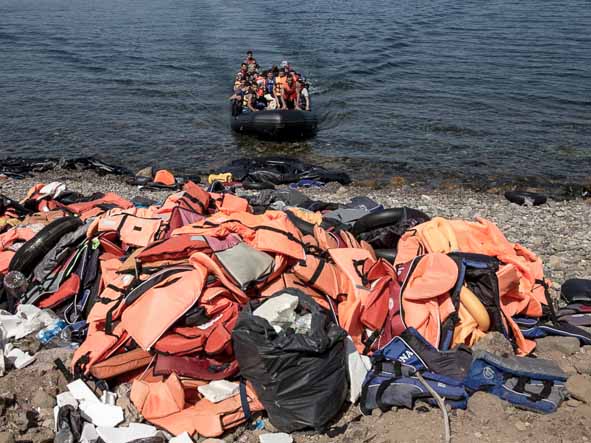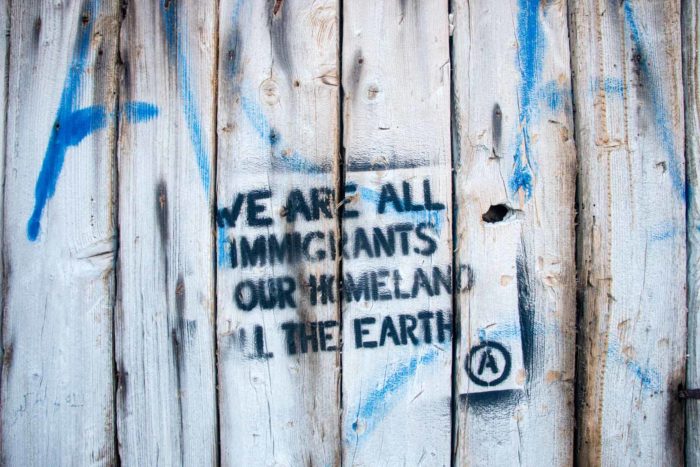Hostipitality

Migrants and refugees arrive by dinghy behind a huge pile of life vests after crossing from Turkey to the island of Lesbos Greece, Sept. 10, 2015 (image credit: Freedom House, no copyright).
In the poem Dr Rodanthi Tzanelli places her critical lens on a local instance of human suffering to reflect on the global refugee crisis.
Hostipitality[1]
Hostility and hospitality
make the best friends in the margins of Europe.
We learn on the evening news:
the spectacle of tragedy too grand to grasp,
flotillas of dreams washed ashore on Chios and Lesbos,
where less than two centuries ago my grandparents arrived,[2]
victims of another war.
The bodies are moved out of the water,
like delicious fish, caught in strong nets
- an endless bureaucracy weaving helpless island communities
all the way from the Aegean,
across dark European metropoles,
and mysterious networks of process.
A massive, ongoing meat business.
The bodies are not allowed an afterlife,
we indulge our curiosity only in tokens of the journey
promised to their departed owners.
Tokens can enter museums,
shrines of memory,
and storms of activist tears
- not too much hassle,
just a sigh during the pedagogical tour.
Or perhaps more than that.
The bodies grow wings to fly across the deep blue sea;
once gently placed in small coral coffins,
next to shipwrecks,
they turn into gleaming medusas,
swift mermaids,
dangerous creatures for young captains
daring to sail during the weeks of meltémi.[3]

We are all immigrants, our homeland all the earth (image credit: Ann Wuyts, Flickr, Attribution 2.0 -Generic CC BY 2.0)
It’s summer again.
Holiday airplanes circle the zone of the carnage,
then make a U-turn
and land at a safe distance from the camps.
©Rodanthi Tzanelli
ALTERMODERNITIES
Dr Rodanthi Tzanelli is Associate Professor of Cultural Sociology and member of the Editorial Board of the Northern Notes Blog, School of Sociology & Social Policy at Leeds.
--------------------------------------------------------------------------------------------------------------------------------
[1] Compound of hospitality and hostility, this philosophical term exposes the Janus-like nature of accepting a stranger in one’s domestic hearth. The host or ‘hostis’ is both the guest and the host, as all of us enclose these two antithetical functions and identities within.
[2] Due to their proximity to the shores of Asia Minor (coastal Turkey), these two islands served as the first stop for Greek populations fleeing their homes (and avoiding massacre in the hands of nationalist Turkish soldiers) during the last war between Greece and the former Ottoman Empire (New Turkey) between 1919 and 1923. My grant parents were among them.
[3] The etesian (annual) winds, meltémia, or meltem (in Turkish) are a dominant weather influence in the Aegean Basin. They are the strong, dry north winds of the Aegean Sea, which blow from about mid-May to mid-September. The name is probably a loan from the Italian mal + tempo, or bad weather.
